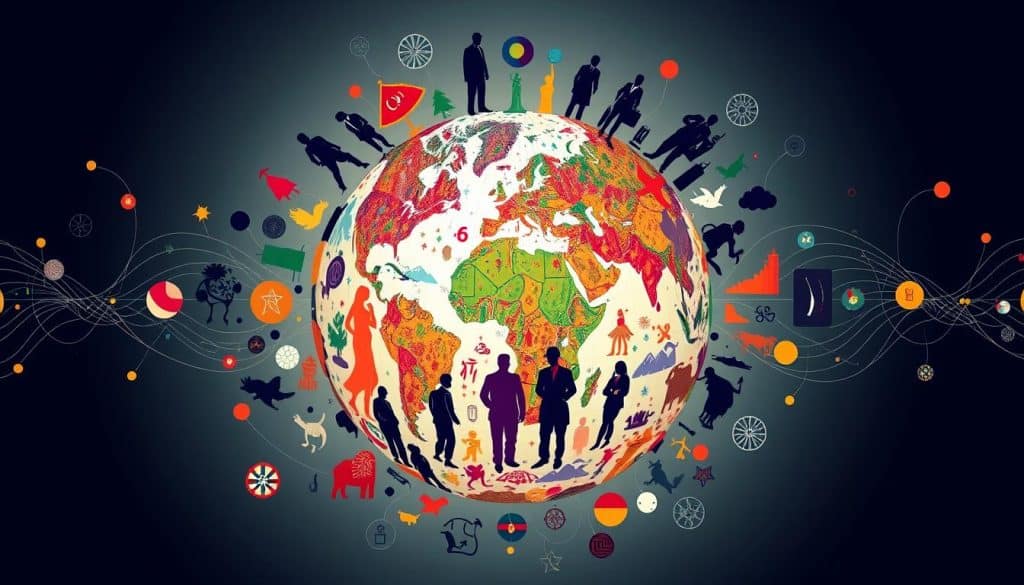In today’s world, knowing about different cultures is key for business success. Companies must learn to work well in many cultures to do well. This is because the world is more connected than ever before.
Bjorn Reynolds, CEO of Safeguard Global, says the digital world has made it easier for businesses to grow globally. This has led to more teams working across cultures. It shows how important it is to understand different cultures in business.
Our research shows cultural sensitivity is crucial for global marketing. It affects how 87% of consumers see a brand. This makes it very important for businesses wanting to succeed worldwide.
Companies that focus on cultural awareness see a 40% boost in loyalty from diverse customers. This shows how big of a difference cultural understanding can make in business success globally.
We will look into how cultural sensitivity can change the game for international businesses. Understanding cultural differences is key for building strong relationships and success in foreign markets.
Understanding Cultural Sensitivity in Global Business
Cultural sensitivity is key to success in international business. As companies grow globally, they must understand different cultures. This helps in building strong relationships across borders.
Defining Cultural and Regulatory Compliance
Cultural compliance means adjusting business to local customs and values. Regulatory compliance is about following laws in various countries. Both are vital for smooth global operations.

Impact on International Operations
Cultural sensitivity greatly impacts business abroad. Companies that focus on cultural awareness see better teamwork. They also understand customer needs better, improving customer satisfaction.
Role in Building Cross-border Relationships
Cultural sensitivity is crucial for strong international partnerships. 45% of global company executives see it as essential. By respecting local customs and adapting communication, businesses build trust and lasting relationships worldwide.
- Organizations with cultural sensitivity training report 34% higher employee engagement
- Diverse teams can enhance creativity and problem-solving by up to 20%
- Companies implementing cultural sensitivity initiatives achieve a 25% improvement in market share within diverse customer bases
Understanding and embracing cultural differences is crucial in today’s world. By investing in cultural sensitivity, companies can open new opportunities and grow sustainably across borders.
The Strategic Value of Local Expertise

Local expertise is key for global businesses to thrive. Many companies have failed due to cultural misunderstandings. For example, Chevrolet’s Nova model didn’t sell well in Latin America because “Nova” means “it doesn’t go” in Spanish.
Market insights from local experts can avoid these mistakes and improve business. IKEA’s success in India in 2016 shows this. They used local knowledge to create marketing that appealed to families and city living. This approach was well received in a tough market.
The benefits of local expertise go beyond marketing. It helps with:
- Navigating regulatory landscapes
- Understanding consumer behaviour
- Adapting products to local tastes
- Building strong relationships with local stakeholders
About 70% of global expansions fail due to cultural differences. So, investing in local expertise is crucial. Businesses that focus on cultural intelligence and use local insights can see a 30% increase in market share. This shows how vital local expertise is for global success.
Navigating Cultural Complexities in Different Markets
Understanding different cultures is key in global markets. It helps in knowing how to communicate and follow business rules. This can make a brand 80% more credible, as people see it as real and connected.

Communication Styles and Business Etiquette
Communication styles change a lot between cultures. In Japan, indirect talk and subtle signs are important. On the other hand, Brazil likes personal and flexible management. Getting these right can increase engagement by 25% worldwide.
Decision-making Processes Across Cultures
It’s vital to know how people make decisions in different places. In India, what motivates teams is very different. Tailoring strategies for local cultures can lead to a 50% increase in market share abroad.
Building Trust in Various Cultural Contexts
Trust is key to success across cultures. Brands that adapt to local tastes see a 39% rise in sales. Tim Hortons, for example, changed its menu for the U.S. to fit American tastes.
Being culturally aware helps businesses connect better with different people. It also helps avoid mistakes in foreign markets.
Prioritising Cultural Sensitivity is Essential for Global Success
In today’s world, being culturally sensitive is key to success. Our research shows how important it is for businesses to be inclusive and understand different cultures. This helps them perform better globally.
Creating Inclusive Business Practices
Companies that are inclusive do very well. A huge 75% of consumers prefer to buy from brands that respect their culture. This leads to higher customer satisfaction, with a 20% increase seen in culturally aware companies.

Developing Cultural Intelligence
Investing in cultural intelligence pays off big time. Companies that train in diversity and inclusion see a 30% jump in employee engagement. They also keep their employees longer, with a 15% increase in retention.
Measuring Impact on Business Performance
Cultural sensitivity greatly improves business performance. Companies that adapt to local cultures see their market share grow by 40%. They are also seen as 60% more trustworthy by clients from different backgrounds.
- Cross-cultural training cuts language misunderstandings by over 50%
- Adapting to local customs boosts negotiation success by 30%
- Businesses that focus on cultural sensitivity face 25% less reputational harm
These figures show how vital cultural sensitivity is for global success. By being inclusive, developing cultural awareness, and measuring its effects, businesses can grow and thrive internationally.
Implementing Cultural Training and Development

Cultural training is key in today’s diverse business world. It helps win new contracts and improve client trust. Our training includes workshops, e-learning, and immersive experiences for all levels.
Programmes on cultural sensitivity bring great results. Diverse teams see 35% more financial gains and 70% more market capture. This shows why diversity and inclusion are crucial investments.
Good cultural training boosts creativity and problem-solving. It also makes employees happier and more likely to stay. For example, Google’s bias training made their workplace more united.
- 94% of executives believe workplace culture is important to business success
- 88% of employees consider workplace culture important to business success
- 56% of employees prioritise company culture over salary when considering a job offer
Combining cultural training with diversity efforts makes workplaces better. This approach reduces misunderstandings and makes companies more appealing to talent.
Technology Integration in Cross-cultural Business Operations
In today’s world, technology is key in bridging cultural gaps. It helps in making cross-border collaborations work well. Advanced tools and platforms have changed how companies work in different cultures.
AI and Cultural Intelligence Tools
AI is changing how businesses work across cultures. A study found 72% of executives think AI will bring big benefits soon. These tools help understand cultural differences, giving insights for making decisions in multicultural settings.
Digital Communication Platforms
Digital communication is vital for global business talks. With over 4.2 billion active social media users, tools like Microsoft Teams and Slack have boosted team productivity by 50%. They make working together across time zones and cultures easy.

Data Analytics for Cultural Insights
Cultural data analytics give deep insights into market tastes and habits. For example, IKEA saw a 15% sales boost by using data to tailor its offerings for India. This way, businesses can adjust their strategies for different cultures.
While technology helps in cross-cultural work, it’s important to remember it should support, not replace, human understanding. By using technology with cultural awareness, companies can build stronger global ties and achieve success worldwide.
Building Sustainable International Business Relationships
In today’s world, building sustainable international business relationships is key for lasting success. Our research found that 66% of senior executives see cultural differences as the biggest challenge in global business. This highlights the need for cultural sensitivity in building strong partnerships across borders.
To make lasting connections, we must understand and respect different cultures. Companies that value cultural diversity are 1.7 times more likely to innovate, Deloitte found. This diversity boosts creativity and strengthens our global network, opening up new chances and insights.
Trust is essential for sustainable business relationships. Our studies show that 80% of professionals think trust is vital for successful international partnerships. By improving our cultural awareness and adapting our practices, we can build strong, lasting bonds with partners around the world.
Long-term partnerships need mutual respect and shared values. Companies with high cultural intelligence see a 30% increase in market penetration, compared to those with lower awareness. By investing in cultural training and creating an inclusive environment, we lay the groundwork for sustainable growth and success globally.

